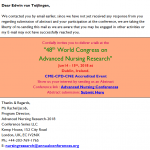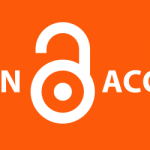Open Access: not every new journal is rogue!
Open Access publishing is the hot topic in academic publishing. It comes from the idea that publicly funded research used to end up in expensive journals which are difficult to access and which are expensive to users. It also made for real ivory tower research and it did not give the general public, often the funder of research through taxation or charity access to the studies which they ‘paid’ for in the first instance. The success shows in (a) the rising Impact Factors of online Open Access journals, such as, for example BMC Pregnancy & Childbirth; (b) the requirement for the UK funding bodies that all research its funds needs to be published as Open Access by 2016; and (c) the growing number of traditional academic journals that now offer authors the option to pay for online Open Access in addition to the traditional paper-based journal publication, for example Midwifery. Two further signs of success are: (d) the growing popularity of Open Access Week, this month (20-26 Oct.) we celebrate for the 7th time Open Access Week ( http://www.openaccessweek.org/); and (e) the growing number of rogue journals trying to cash in on the Open Access trend.
The latter is the ugly face of capitalism whereby opportunists, i.e. unscrupulous publishers jump on the bandwagon cashing in on a successful service. BU librarian Jean Harris recently shared an interesting article about Predatory Publishers (see: www.cilip.org.uk/cilip/blog/are-we-doing-enough-warn-users-about-predatory-journals?utm_source=Communicator_membership_list&utm_medium=Email&utm_content=Untitled21&utm_campaign=Weekly+News+from+CILIP%2c+18+Sept+2014). Predatory publishers create a convincing looking scientific journal on the web, often borrowing details from other journals. They then email academics and researchers for both manuscripts and the offer to sit on the journal’s editorial board. Submissions are then “peer reviewed” and an invoice for Open Access publishing emailed by return. No submission is rejected! Many of us will have received such spam emails.
The message is not the fall for the scam. Prospective authors should check the webpages of the journal (although some fake ones can be convincing). Talk to more experienced colleagues in your field or your librarian to find out what they know about the ‘new’ journal, do they know someone on the editorial board. Is the journal listed in reputable electronic databases such as SCOPUS? Please, do not rely on information from Google on the journal you are trying to suss out!
Prof. Edwin van Teijlingen
CMMPH

 Fake conferences are not fake news: beware predatory conferences
Fake conferences are not fake news: beware predatory conferences Publish Open Access in Springer Journals for Free!
Publish Open Access in Springer Journals for Free!










 Dr. Ashraf cited on ‘Modest Fashion’ in The Guardian
Dr. Ashraf cited on ‘Modest Fashion’ in The Guardian NIHR-funded research launches website
NIHR-funded research launches website Academics write for newspaper in Nepal
Academics write for newspaper in Nepal New paper published on disability in women & girls
New paper published on disability in women & girls MSCA Postdoctoral Fellowships 2025 Call
MSCA Postdoctoral Fellowships 2025 Call ERC Advanced Grant 2025 Webinar
ERC Advanced Grant 2025 Webinar Horizon Europe Work Programme 2025 Published
Horizon Europe Work Programme 2025 Published Horizon Europe 2025 Work Programme pre-Published
Horizon Europe 2025 Work Programme pre-Published Update on UKRO services
Update on UKRO services European research project exploring use of ‘virtual twins’ to better manage metabolic associated fatty liver disease
European research project exploring use of ‘virtual twins’ to better manage metabolic associated fatty liver disease
Can I add to this timely blogpost on predatory publishers:
This is where Beall’s List of Predatory Publishers (http://scholarlyoa.com/2014/01/02/list-of-predatory-publishers-2014/) comes in.
You may not agree with his politics,
(http://scholarlykitchen.sspnet.org/2013/12/16/parting-company-with-jeffrey-beall/)
which are anti -OA and pro subscription journals, but his list of predatory publishers,
updated by the blog (http://scholarlyoa.com/) , is very useful in making publishing decisions.
Make use of this together with the sources listed below as Beall’s list does include some new starters that are perfectly legitimate.
Check if the journal appears in recognised sources such as:
• SherpaRomeo (www.sherpa.ac.uk/romeo)
• Scopus
• DOAJ- Directory of Open Access Journals (www.doaj.org)
• Web of Science
And finally
Declan Butler (2013) provides a useful checklist in his article
Investigating journals: the dark side of publishing. Nature [online] 495, 432-435
Buyer beware: A checklist to identify reputable publishers
How to perform due diligence before submitting to a journal or publisher.
• Check that the publisher provides full, verifiable contact information, including address, on the journal site. Be cautious of those that provide only web contact forms.
• Check that a journal’s editorial board lists recognized experts with full affiliations. Contact some of them and ask about their experience with the journal or publisher.
• Check that the journal prominently displays its policy for author fees.
• Be wary of e-mail invitations to submit to journals or to become editorial board members.
• Read some of the journal’s published articles and assess their quality. Contact past authors to ask about their experience.
• Check that a journal’s peer-review process is clearly described and try to confirm that a claimed impact factor is correct.
• Find out whether the journal is a member of an industry association that vets its members, such as the Directory of Open Access Journals (www.doaj.org) or the Open Access Scholarly Publishers Association (www.oaspa.org).
• Use common sense, as you would when shopping online: if something looks fishy, proceed with caution.